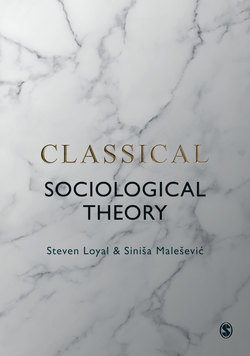Читать книгу Classical Sociological Theory - Sinisa Malesevic - Страница 38
На сайте Литреса книга снята с продажи.
Arguments and Ideas Confucian Social Philosophy
ОглавлениеConfucius’s ideas have occasionally been described as a predecessor of sociological thought. For example, Cho (1996: 112) argues that ‘Confucianism was, in a sense, Durkheim’s “moral education” and Weber’s “ethic of responsibility” combined into a single set of doctrines’. However, unlike nineteenth- and early twentieth-century sociologists whose principal focus was to explain the changing dynamics of social life, Confucius’s interests were more prescriptive: to identify the ultimate ethical principles that should govern human conduct. In this Confucius was not unique as nearly all pre-modern thinkers tended to privilege prescription over description and explanation. In a similar vein to Mohists, Confucianism emphasises cosmic harmony between heaven and earth (tian) and endeavours to establish such harmonious relationships in social life: ‘This equilibrium is the great root from which grow all the human actings in the world, and this harmony is the universal path which they all should pursue’ (Confucius, Chung Yung 1, 1991).
For Confucius, the key guiding moral principle was to strive towards achieving and maintaining virtuous behaviour on both the individual and collective level. In his understanding the social and political virtues directly reflect personal virtues, and virtuous society can only be composed of virtuous citizens. In this context, Confucius advocated traditional values including ancestor worship, the preservation of rituals, respect for the elders by their descendants, clearly defined filial and gender duties, and strong family loyalties. Moreover, the family was seen as the cornerstone of society and the ideal government was to resemble family relationships of love, responsibility and mutual interdependence. Nevertheless, in addition to his moral prescriptions, Confucius was also an astute social analyst who developed a highly influential social philosophy that centred on the importance of self-cultivation and discipline, topics that dominate the latter-day sociologies of both Weber and Elias. For Confucius, a superior human being is defined by his or her ability to exercise self-restraint and to engage in permanent self-cultivation. In his own words, ‘the gem cannot be polished without friction, nor man perfected without trial’ (Confucius, 19 in The Analects, 1979).
